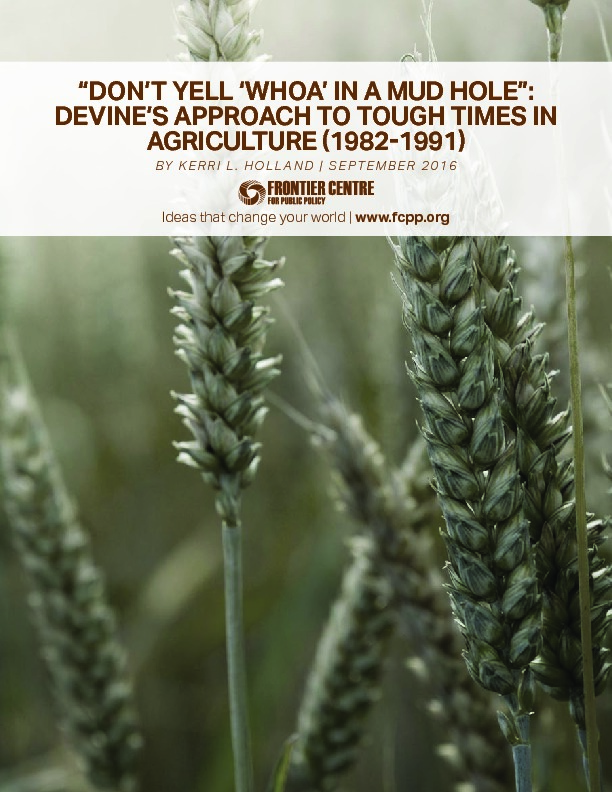The Frontier Centre for Public Policy today released a study by Mary-Jane Bennett, a Senior Fellow at the Frontier Centre for Public Policy. As the Crow Flies: Transportation Policy in Saskatchewan and the Crow’s Nest Pass Agreement studies the Crow rate, one of the...
Agriculture
“Don’t Yell ‘Whoa’ In A Mud Hole”: Devine’s Aproach To Tough Times In Agriculture (1982-1991)
Kerri L. Holland The primary objective of agricultural diversification is to facilitate economic stability and prosperity for the agricultural industry and the larger economy. Moreover, the topic of diversification is best understood within the broader discussion of...
It’s Time to End Supply Management
Conservative Party of Canada leadership candidate Maxime Bernier has come out against the long standing practice of agricultural supply management for dairy, poultry and eggs. It is rare for a Canadian politician to take on this issue, but the evidence is overwhelming...
Grain gets poor grades
Canada’s grading system has made it a laggard and laughingstock. In heralding the end of the Canadian Wheat Board in 2012, former Agriculture Minister Gerry Ritz proclaimed that Canadian farmers finally had the right to sell their wheat and barley on the open...
Featured News
Weaponizing the Law
The indictment of former U.S. president Donald Trump for crimes invented by his political opponents is the most egregious example yet seen of the weaponizing of the law. The United States is now full of examples. However, in Canada, we also see the law being...
“Looking At” Seizing Control Over Western Canada’s Natural Resources
OTTAWA, REGINA - Last week, two things happened that could have profound impacts on natural resources development in Saskatchewan. One is a hint the federal government might want to take control of natural resources away from the provinces, and the other is the...
The Sky Did Not Fall After All: On the one year anniversary of the end of the Canadian Wheat Board’s marketing monopoly
The one-year anniversary on Aug. 1 of the removal of the 75-year Canadian Wheat Board monopoly on western wheat and barley sales was marked with celebration in some quarters. None of the consequences predicted by single -desk monopoly supporters came close to materializing.
McDouble is ‘cheapest and most nutritious food in human history’
Describing the McDonald’s double cheeseburger as “the cheapest, most nutritious, and bountiful food that has ever existed in human history” might seem beyond fanciful, but according to the author of Freakonomics, it is not as absurd a suggestion as it appears.
The Anti-Science Wing of the Organic Movement
Rachel Carson’s book Silent Spring, published over half a century ago, lent itself for organic activists to “cherry-pick” from her writings and to adopt the prevalent view that anything synthetic is bad and everything natural is good. A mere handful of organic...
Media Release – Rachel Carson and Organic Cherry-Picking: The Anti-science Wing of the Organic Movement
Rachel Carson, the author of the influential book Silent Spring receives all the credit for the rise of the organic movement, but Carson’s work is barely scientific. Carson’s book provides organic activists with exactly what they want to hear.
The Environmental State of Canada: 2013 Update
Executive Summary Canadians view the protection and preservation of the natural environment as one of the most important functions of their governments. This paper provides an overview of the major developments in Canada’s environmental performance over the past...
What We Can Learn About Open Markets From Wine and Wheat
Canadian history is filled with tales of protected industries destined for oblivion because of free trade, foreign threats or lost subsidies. But the worst-case scenario rarely plays out as predicted. Consider two prominent examples from the past quarter-century: the advent of free trade for Ontario’s wine industry and the end of the subsidized freight rates for Western grain farmers. In both cases, disaster was predicted. Yet both sectors adapted and emerged stronger.
Chicken Processing Bonanza Alberta bound
It's no secret that Canadian so-called supply management marketing board policies are a destructive relic from the 1970s. Frontier, along with several other Canadian think tanks has written extensively how they artificially raise prices for consumers while...
Canada’s Supply-Managed Stranglehold: How a system designed to help farmers is stopping companies from doing all the good things Ottawa says it wants from businesses – innovating, exporting and taking risks.
Critics of supply management have typically focused on the high cost paid by consumers. Cami’s predicament demonstrates how lost export opportunities and the stifling of agricultural innovation is harming a much broader swath of the economy. Supply management is sapping economic growth, jobs and productivity, up and down the food chain, not to mention the hit on government revenues.
Government Must Stand up for Farmers and Commit to Ending Supply Management
Martha Hall Findlay has brought attention to Canada’s system of supply management; a system in which production quotas are allocated to dairy, poultry, turkey and egg farmers, and prices are set by their respective marketing boards. Farmers themselves are the victims of this status quo – particularly export dependent producers in Western Canada.

